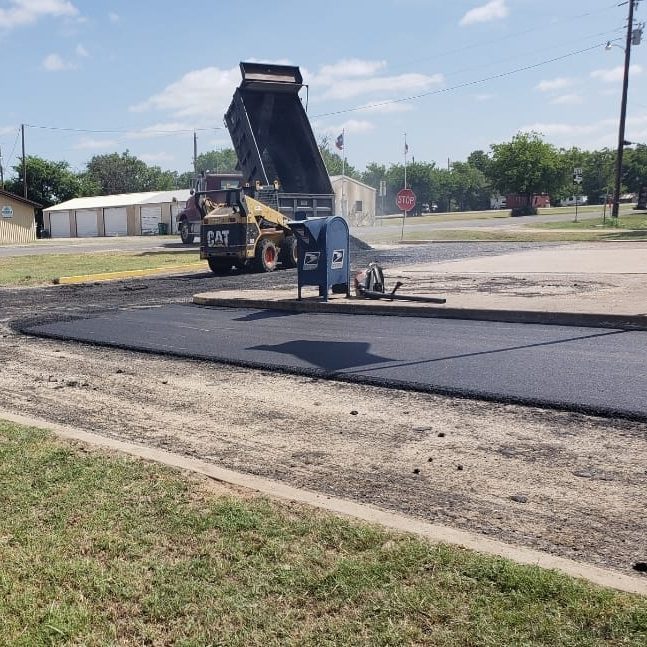Affordable Paving Options for Your Driveway
Affordable Paving Options for Your Driveway
Blog Article
Exploring the Various Kinds of Asphalt Paving and Their Benefits
From the robust features of Hot Mix Asphalt to the environment-friendly attributes of Recycled Asphalt Sidewalk, understanding these choices can considerably influence project results. Developments such as Warm Mix Asphalt and Porous Asphalt present extra layers of performance and sustainability.
Hot Mix Asphalt
When taking into consideration the most reliable leading services, warm mix asphalt (HMA) stands out as a top selection for many applications (paving service). HMA is a versatile leading material known for its toughness, adaptability, and overall efficiency. It is created by heating asphalt binder and combining it with aggregates at heats, guaranteeing a consistent blend that can hold up against numerous environmental problems
Among the main advantages of HMA is its capacity to offer a smooth, skid-resistant surface, boosting safety and security for vehicles and pedestrians alike. Additionally, HMA shows excellent resistance to deformation, making it optimal for high-traffic areas such as highways and vehicle parking whole lots. Its adaptability to different environments even more adds to its extensive usage.
The installment process of HMA is reasonably fast, enabling effective job completion with minimal disruption to website traffic. It can be recycled, decreasing waste and promoting sustainability within the building industry. paving. In general, warm mix asphalt continues to be a leading choice for leading specialists due to its robust efficiency characteristics and long-lasting cost-effectiveness, making it a dependable service for numerous infrastructure needs
Warm Mix Asphalt
Warm mix asphalt (WMA) uses an ingenious alternative to warm mix asphalt, supplying comparable advantages while requiring reduced production temperatures. Normally created at temperature levels between 190 ° F and 250 ° F, WMA innovation reduces energy consumption and greenhouse gas exhausts throughout production, making it an extra eco pleasant choice.
This versatility can lead to boosted compaction and overall toughness of the asphalt surface. Additionally, WMA can be utilized in numerous applications, ranging from highways to household driveways, without jeopardizing performance.

The consolidation of additives or changed binders in WMA adds to its enhanced residential or commercial properties, ensuring that it fulfills or goes beyond performance requirements. Furthermore, WMA's reduced thermal effect during production can decrease the probability of damage to the surrounding setting, making it an appealing selection for sustainable paving techniques.
Cold Mix Asphalt
Cold mix asphalt is a versatile paving option generally made use of for short-term repair work and low-traffic areas. This kind of asphalt is produced at ambient temperature levels, making it a practical selection for quick repairs and projects where typical warm mix asphalt might not be possible. The mixture typically consists of asphalt binder, accumulation, and additives, allowing it to stay workable for a prolonged duration.
One of the primary advantages of chilly mix asphalt is its convenience of application. It can be set up without customized equipment, making it easily accessible for smaller sized specialists and do it yourself fanatics. Additionally, chilly mix can be applied in watch here different climate condition, which is particularly useful for immediate repair requirements.

Cold mix asphalt is also economical, as it enables budget-friendly repairs without giving up top quality. Its adaptability makes it suitable for patching fractures, filling cracks, and resurfacing driveways. Although it may not give the very same lasting toughness as warm mix asphalt, its quick application and adaptability make it a superb choice for short-lived remedies and low-traffic applications. On the whole, chilly mix asphalt continues to be a useful option in the asphalt paving landscape.
(learn everything)
Porous Asphalt
Permeable asphalt is an ingenious paving service developed to enhance stormwater administration and decrease surface area overflow. This sort of asphalt features an unique structure that incorporates interconnected gaps, permitting water to penetrate with the surface and into the underlying layers. By facilitating natural drain, porous asphalt aids alleviate the threat of flooding and decreases the problem on community stormwater systems.
Among the key benefits of permeable asphalt is its capability to boost water top quality. As stormwater infiltrate the pavement, toxins and sediments are caught, decreasing the number of pollutants that get in local waterways. This contributes to much healthier ecosystems and supports conformity with environmental policies.
Additionally, permeable asphalt can improve the durability of the pavement itself. By lowering water buildup on the surface area, it decreases the possibility for freeze-thaw cycles that can lead to fracturing and deterioration. Furthermore, the lowered requirement for standard stormwater monitoring infrastructure can result in price financial savings for districts and designers.
Recycled Asphalt Sidewalk
(learn today)Recycled asphalt sidewalk (RAP) represents a sustainable technique to road building and upkeep that benefits both the setting and the economic situation. By recycling existing asphalt materials, RAP reduces the demand for new basic materials, which consequently conserves natural deposits and decreases ecological influence. This practice lowers energy usage and greenhouse gas emissions connected with the manufacturing of new asphalt.
The unification of RAP right into brand-new pavement blends can additionally result in significant cost financial savings. Professionals can utilize recycled products to reduce overall project expenditures, making it an economically practical option for towns and private developers alike. In addition, RAP provides equivalent performance characteristics to virgin asphalt, ensuring durability and durability in road surface areas.
RAP's adaptability permits it to be made use of in different applications, consisting of freeways, parking area, and residential driveways. By improving the architectural stability of existing sidewalks, RAP adds to boosted security and level of smoothness of highways.
Conclusion
Hot Mix Asphalt succeeds in toughness and quick setup for high-traffic areas, while Cozy Mix Asphalt enhances sustainability via lowered energy intake. Cold Mix Asphalt serves as an affordable choice for immediate repairs, Porous Asphalt properly manages stormwater, and Recycled Asphalt Pavement promotes ecological obligation.
Report this page